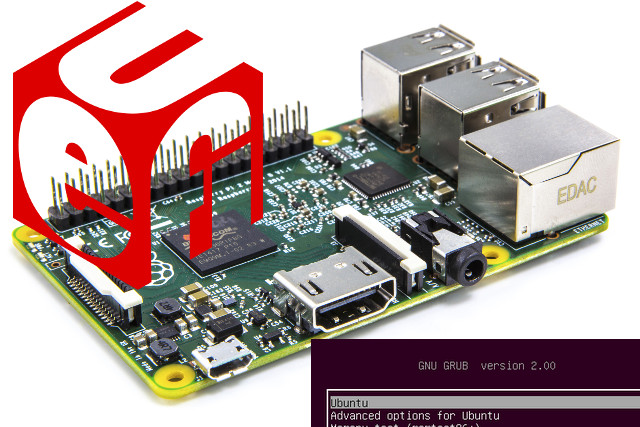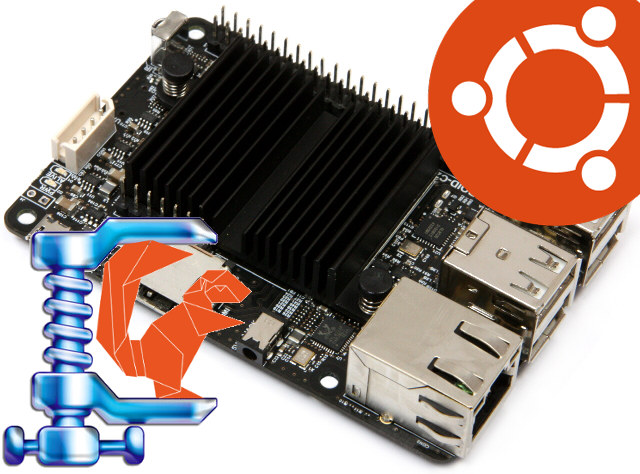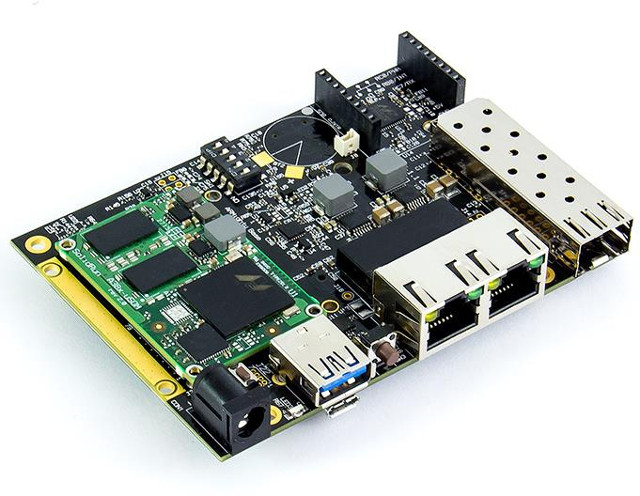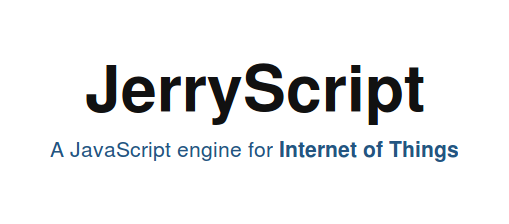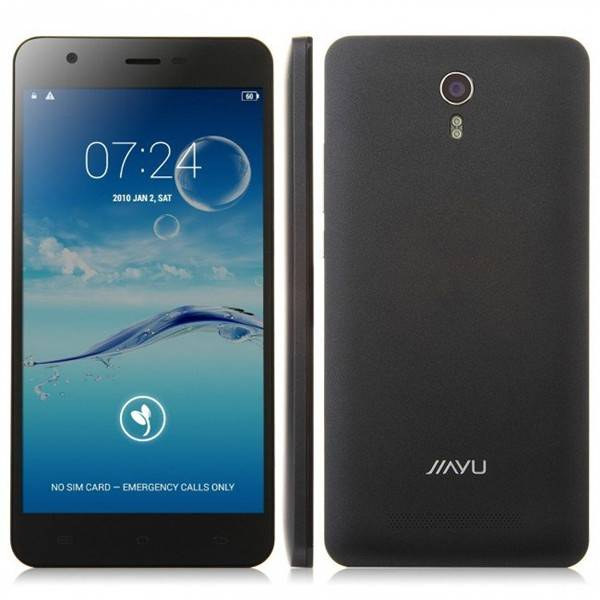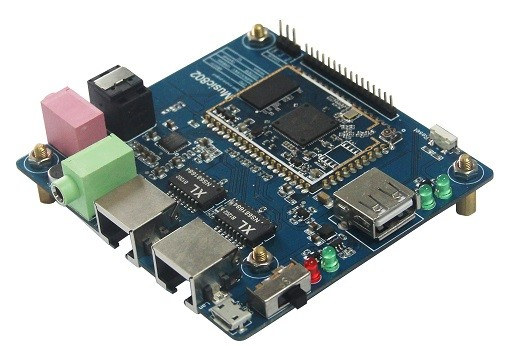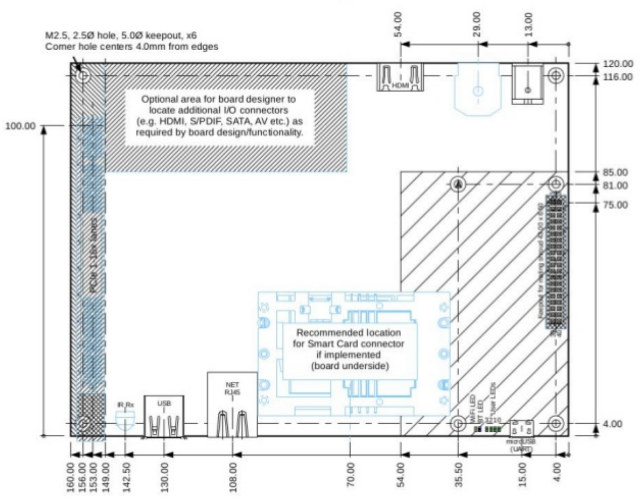Intel/AMD x86 based computers now boot via a standard UEFI binary, which can load grub2, allows you to update the command line as needed, or select different version of the Linux kernel. On ARM everything is a little more complicated and messy, as bootloaders such as U-boot need to support different configurations formats. Alexander Graf has been working on implementing UEFI support in U-boot, and it’s now supported by U-boot mainline and enabled by default for 32-bit and 64-bit ARM platforms, but not x86-64 (yet). That means you should now be able to boot any ARM boards supported by mainline U-boot through UEFI. Alexander gave a presentation about his work at an openSUSE event in June, and demonstrated u-boot with UEFI, and GRUB2 support with an openSUSE image running on a Raspberry Pi board. Thanks to David for the tip. Jean-Luc Aufranc (CNXSoft)Jean-Luc started CNX Software in 2010 as a […]
Minimal Ubuntu 16.04 Image for ODROID-C2, and C1/C1+ Boards, Ubuntu Core Image for Bubblegum-96 Board
If you’ve been wanting minimal Ubuntu distributions for your server, IoT, or other headless projects, there are some good news from Hardkernel with the release of a minimal Ubuntu 16.04 image for ODROID-C2 and ODROID-C1+ boards, and Canonical has recently announced Actions Semi S900 based BubbleGum-96 board was getting support for Ubuntu Core distribution. If you’re using an ODROID board you can download ubuntu64-16.04-minimal-odroid-c2-20160803.img.xz (196MB) firmware, which become 1.7 GB once uncompressed and flash it 2GB or greater micro SD card. After Raspberry Pi 2 and Samsung Artik 5/10, Bubblegum-96 is the third officially supported board that can run Ubuntu Core. You can download the 3.63GB beta image and instructions to flash it from an Ubuntu 16.04 machine on Mega. Bugglegum-96 is a 96boards compliant development board based on an quad core Cortex A53 processor with 2GB RAM and 8GB flash manufactured and sold by ucRobotics for $89. Jean-Luc Aufranc […]
SolidRun ClearFog Base is a $90 Router/Networking Board with USB 3.0, M.2, mSATA, and Gigabit Ethernet Support
SolidRun introduced ClearFog Pro and Base board based on Marvell Armada 380/388 processor at the end of last year, but at the time, only the higher-end ClearFog Pro board was available for $170 and up. Now the company has officially launched the cheaper ClearFog Base board based on the same processor, two Gigabit Ethernet RJ45 ports, one SFP cage, a USB 3.0 port, an M.2 slot, mPCIe expansion slot, and more. ClearFog Base board specifications: Processor – Marvell ARMADA 388 (88F6828) dual core ARMv7 processor (Cortex A9 class) @ up to 1.6 GHz with 1MB L2 cache, NEON and FPU System Memory – 1GB RAM by default (2GB optional) Storage – 1x micro SD slot, optional 4GB eMMC flash, 1x M.2 slot, 1x mSATA/mPCIE Connectivity – 2x dedicated Gigabit Ethernet ports, 1x SFP cage USB – 1x USB 3.0 port Expansions 1x mini PCI Express slots (shared with mSATA ) 1x […]
Samsung JerryScript is a Lightweight Open Source JavaScript Engine for the Internet of Things
In the old days, micro-controller programming was all done in assembly or C, but in recent years higher level languages, included interpreted ones such as Python and JavaScript, have made their ways into MCUs with projects such as MicroPython or Espruino (JS) often running on STMicro STM32 ARM Cortex M micro-controllers, but also other platforms such as ESP8266. As I browsed through the Embedded Linux Conference Europe 2016 schedule, I discovered that Samsung worked on it own implementation of a JavaScript engine for the Internet of Things: JerryScript. It is a full implementation of ECMAScript 5.1 standard written in C that can run on micro-controllers with less than 64KB RAM, and less than 200KB storage (160KB footprint with ARM Thumb-2 compilation). JerryScript is comprised of two main components: Parser and Virtual Machine (VM), with the parser performing translation of input ECMAScript application into byte-code than is then executed by the Virtual […]
Embedded Linux Conference & IoT Summit Europe 2016 Schedule
Embedded Linux Conference & IoT summit 2016 first took place in the US in April, but the events are now also scheduled in Europe on October 11 – 13 in Berlin, Germany, and the schedule has now been published. Even if you are no going to attend, it’s always interesting to find out more about the topic covered in that type of events, so I had a look, and created my own virtual schedule with some of the sessions. Tuesday, October 11 10:40 – 11:30 – JerryScript: An Ultra-lightweight JavaScript Engine for the Internet of Things – Tilmann Scheller, Samsung Electronics JerryScript is a lightweight JavaScript engine designed to bring the success of JavaScript to small IoT devices like lamps, thermometers, switches and sensors. This class of devices tends to use resource-constrained microcontrollers which are too small to fit a large JavaScript engine like V8 or JavaScriptCore. JerryScript is heavily […]
Jiayu S3 and S3 Plus Smartphones Get Android 6.0 Firmware Releases with Source Code
Jiayu S3 and S3 Plus are your typical Android smartphones powered by Mediatek MT6752/MT6753 octa core Cortex A53 processor with 3GB RAM, 16GB flash, and a 5.5″ touch screen display. The news here is that Jiayu Germany (a reseller, not the manufacturer), and Team M.A.D (Mediatek Android Developers) comprised of XDA members, have releasing three custom ROMs based on Android 6.0.1 for the smartphone: Cyanogenmod13, Paranoid Android (AOSPA) and AICP (Android Ice Cold Project), which contrast with my Iocean MT6752 smartphone still stuck on Android 4.4.4. I’ll reproduce the technical specifications of Jiayu S3+ phone for reference: SoC- Mediatek MT6753 Octa-core 64-bit ARM Cortex A53 processor @ 1.3 GHz, with ARM Mali-T720 GPU System Memory – 3GB RAM Storage – 16 GB eMMC + micro SD slot up to 64GB Display – 5.5” IPS capacitive touchscreen display; 1920×1080 resolution Connectivity – 802.11 b/g/n/ac Wi-Fi , Bluetooth 4.0, GPS / A-GPS, FM Radio Cellular […]
Music802 Linux Audio & IoT Board is Powered by Atheros AR9331 SoC (Crowdfunding)
When Link Card evaluated processors for a Linux audio IoT board, they considered candidates like Allwinner H3 and Ralink RT5350, but eventually went with Atheros AR9331 due to cost, simplicity, features, and power consumption reasons for their Music802 board based on LC930 system-on-module. Music802 board specifications: SoC – Atheros AR9331 MIPS 24K WiSoC @ 400 MHz System Memory – 64MB DDR2 Storage – 16MB SPI Flash Audio – Cirrus Logic WM8960 Codec; 2x 3.5 mm jacks for Line IN and headphone; optical S/PDIF output; on-board microphone Connectivity – 2x 10/100M Ethernet ports (WAN & LAN), 802.11 b/g/n WiFi with 1x IPEX antenna connector USB – 1x USB 2.0 host, 1x micro USB port for power only Debugging – 3-pin 2.54mm pitch header for serial console Expansion – 16-pin 2.0mm pitch header for GPIO, UART, I2C, etc.. Misc – Power, system, and 2x user LEDs, 1x reset button, 1x power switch […]
96Boards Gets a TV Platform Edition Targeting $50 Mid-range Boards, $99 High-end Boards
96Boards was born as a hardware and software standard with Consumer (CE) & Enterprise Editions (EE), with different form factors with the latter focusing on server boards, but with similar software requirements requiring recent and mostly open source software. The consumer edition was also split into “Standard” and “Extended” editions, which the latter allowing for larger boards with more features, while the Enterprise Edition has its own larger format, as well as an option for micro-ATX form factor. I’ve just learned that a “fifth” 96Boards standard has been worked on with 96Board TV Platform for Home Gateways, OTT Streaming boxes, and TV boards with prices target of $50 or lower for mid-range boards, and $99 or lower for high-end boards. 96Boards TV Platform hardware requirements: Dimensions – 160 x 120 mm (EE Standard form factor) RAM – 1GB minimum; 2GB recommended Flash – 8GB eMMC minimum WiFi – 802.11 g/n […]


